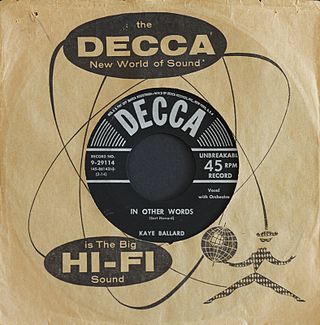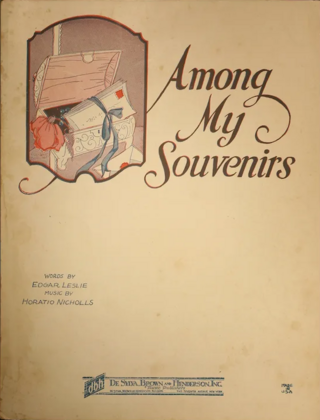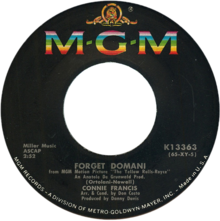
Connie Francis is an American pop singer, actress, and top-charting female vocalist of the late 1950s and early 1960s. She is estimated to have sold more than 100 million records worldwide.

"Fly Me to the Moon", originally titled "In Other Words", is a song written in 1954 by Bart Howard. The first recording of the song was made in 1954 by Kaye Ballard. Frank Sinatra's 1964 version was closely associated with the Apollo missions to the Moon.
Norman Newell was an English record producer and lyricist, who was mainly active in the 1950s and 1960s. He was also the co-writer of many notable songs. As an A&R manager for EMI, he worked with musicians such as Shirley Bassey, Dalida, Claude François, Vera Lynn, Russ Conway, Bette Midler, Judy Garland, Petula Clark, Jake Thackray, Malcolm Roberts, Bobby Crush and Peter and Gordon.
"Mamma" is a popular song composed in 1940 by Cesare Andrea Bixio with Italian lyrics by Bixio Cherubini under the title "Mamma son tanto felice".

"Ti Guarderò Nel Cuore", later released under the international title "More", is a pop song adapted from a film score written by Riz Ortolani and Nino Oliviero for the 1962 Italian documentary film Mondo Cane. Ortolani and Oliviero originally composed the melody as an orchestral arrangement that served as the film's theme music. Italian lyrics were provided by Marcello Ciorciolini, which were adapted into English by Norman Newell. It has since become an easy listening and pop standard.

"True Love" is a popular song written by American songwriter Cole Porter, published in 1956. The song was introduced by Bing Crosby and Grace Kelly in the musical film High Society. "True Love" was nominated for the Academy Award for Best Original Song. Kelly's contribution on the record is relatively minor, duetting with Crosby on only the final chorus. Nonetheless, the single is co-credited to her.

"Hold Me, Thrill Me, Kiss Me" is a song written by Harry Noble and originally performed by Karen Chandler in 1952. It has been re-recorded several times since then, the most notable covers being by Mel Carter in 1965 and Gloria Estefan in 1994.
"Let It Snow! Let It Snow! Let It Snow!", also known as simply "Let It Snow", is a song written by lyricist Sammy Cahn and composer Jule Styne in July 1945 in Hollywood, California, during a heatwave as Cahn and Styne imagined cooler conditions. The song was first recorded that fall by Vaughn Monroe, was released just after Thanksgiving, and became a hit by Christmas.

RizieroOrtolani was an Italian composer, conductor, and orchestrator, predominantly of film scores. He scored over 200 films and television programs between 1955 and 2014, with a career spanning over fifty years.
"Heartaches by the Number" is a popular country song written by Harlan Howard, and published in 1959. The sheet music was a best seller in both the US and Britain in January 1960.

"Who's Sorry Now?" is a popular song with music written by Ted Snyder and lyrics by Bert Kalmar and Harry Ruby. It was published in 1923 as a waltz. Isham Jones had a hit recording in 1923 with the song arranged as a foxtrot. Later sheet music arrangements, such as the 1946 publication that was a tie-in to the film A Night in Casablanca, were published in 2
2 time. Other popular versions in 1923 were by Marion Harris, Original Memphis Five, Lewis James, and Irving Kaufman.

"Everybody's Somebody's Fool" is a song written by Jack Keller and Howard Greenfield that was a No. 1 hit for Connie Francis in 1960. A polka-style version in German, "Die Liebe ist ein seltsames Spiel", was the first German single recorded and released by Connie Francis, and it reached No. 1 on the single chart in 1960 in West Germany.

The Yellow Rolls-Royce is a 1964 British dramatic composite film written by Terence Rattigan, produced by Anatole de Grunwald, and directed by Anthony Asquith, the trio responsible for The V.I.P.s (1963).
"Lara's Theme" is the name given to a leitmotif written for the 1965 film Doctor Zhivago by composer Maurice Jarre. Soon afterward, the leitmotif became the basis of the song "Somewhere, My Love". Numerous versions, both orchestral and vocal, have been recorded, among the most popular was the version by Ray Conniff Singers.
"You're Nobody till Somebody Loves You" is a popular song written by Russ Morgan, Larry Stock, and James Cavanaugh and published in 1944. The song was first recorded by Morgan and was a hit for him in 1946, reaching the No. 14 spot in the charts. The best known version was Dean Martin's, which was released in 1960 and reissued in 1964.

"I'm Gonna Be Warm This Winter" is a 1962 single by Connie Francis, released in that December to peak at #18 on both the Billboard Hot 100 and the Cash Box Top 100. The song reached #22 UK in December 2008 via a remake by Gabriella Cilmi titled "Warm This Winter".

"Among My Souvenirs" is a 1927 song with words by Edgar Leslie and music by Horatio Nicholls.

Grandes Exitos del Cine de los Años 60 is a studio album recorded for the U. S. market by entertainer Connie Francis.
"In the Summer of His Years" is a 1963 pop song with lyrics written by Herb Kretzmer and music by David Lee. Kretzmer and Lee composed the song as a tribute hours after learning that President John F. Kennedy had been assassinated on November 22, 1963 in Dallas, Texas.
"Mae" is a 1965 song written by Riz Ortolani for the MGM motion picture The Yellow Rolls-Royce; the song is the theme for the section of the film in which ownership of the titular Rolls-Royce passes to a gangster and becomes the backdrop to a dangerous romance between the gangster's girlfriend Mae Jenkins and a young Italian named Stefano.












